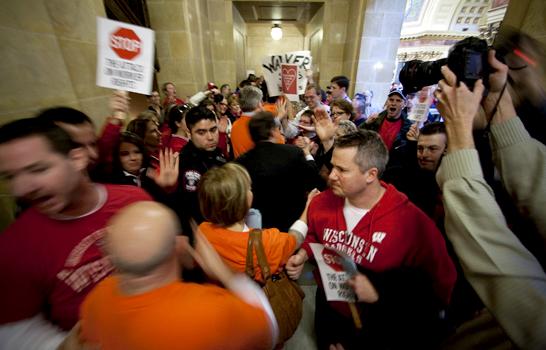Getting Behind the Workers: A Catholic Take on the Protests in Wisconsin
July 23, 2011

Published: March 30, 2011
American politics have an almost religious intensity. In the church of American politics, there is tremendous pressure to choose one of the creeds in the mainstream left/right binary. But every so often there is an issue that should force Catholic Americans to choose between their political affiliation and their faith. Unfortunately many Catholic Americans have deluded themselves into thinking that their religious beliefs are totally compatible with their political beliefs. I can understand that, especially since I once did so myself.
It’s understandable that people would want to reconcile the church of politics with the Church by conflating their respective creeds, at the expense of one or the other. The problem is that when an issue that requires a hard stance presents itself, Catholic Americans often short-change themselves by pretending that both of their creeds offer the same answer—no one wants to think that they are choosing politics over God—and more often than not, they are wrong and side with the wrong creed.
The current situation in Wisconsin is just such an issue. In this case, the conflict presents itself to politically conservative Catholics, although there are plenty of issues that present themselves to politically liberal Catholics as well. There is no shortage of politically liberal Catholics who have spoken to support the protesters in Wisconsin who have been tirelessly demonstrating for the collective bargaining rights that Gov. Scott Walker would like to deprive them of. But if we’re being honest, it’s easy for a liberal to do that since it’s a part of the liberal creed. I haven’t heard a whole lot of politically conservative Catholics come forward and admit that in this case, the Church says something a little different than what their party says. I’m going to give them the benefit of the doubt and guess that it’s because they just don’t know.
I say the following with as much sensitivity as possible since it is a fact that is often met with much resistance from Republican Catholics: The Catholic Church has a rich history of demanding social justice. The Church has been a champion of the poor, the living wage and—yes—unions.
The Catholic answer to the question in Wisconsin is that union workers have a moral claim to their collective bargaining rights. The Church maintains that workers need to have their human dignity acknowledged first and foremost. When work is just seen as a type of merchandise, with no regard for the dignity of the person and the holiness of the work, the Church sees that as akin to social slavery.
In Leo XIII’s 1891 papal encyclical “Rerum Novarum,” he said that “to misuse men as though they were things in the pursuit of gain, or to value them solely for their physical powers—that is truly shameful and inhuman.” Leo impressed the importance of a just wage, and added, “the rich must religiously refrain from cutting down the workmen’s earnings, whether by force, by fraud, or by usurious dealing; and with all the greater reason because the laboring man is, as a rule, weak and unprotected.”
In his 1981 papal encyclical, “Laborem excercens,” John Paul II was explicit in his support of unions: “Their task is to defend the existential interests of workers in all sectors in which their rights are concerned. The experience of history teaches that organizations of this type are an indispensable element of social life, especially in modern industrialized societies.” John Paul called unions “a mouthpiece for the struggle of social justice.” He even went on to insist “workers should be assured the right to strike, without being subjected to personal penal sanctions for taking part in a strike.”
The Church’s position is clear here. Workers are entitled to certain considerations, and they have a right to organize in order to protect those entitlements. To deny workers their collective bargaining rights is to treat them as commodities, which is condemned by the Church.
The level of anger I’ve been seeing from political conservatives about this issue is pretty alarming. In general, it seems like they are bitter. They see union workers as thugs who have unjustly demanded health care and a pension by stomping their feet. What they forget is that human beings actually have a right to health care and the peace of mind offered by a pension—these things aren’t privileges; they’re human rights that have been repeatedly triumphed by Catholic Social Teaching.
Humans have a right not to be treated as commodities. But many white collar Republicans are jealous because they themselves don’t have collective bargaining rights. Is it the fault of union workers that white collar workers aren’t in unions? In “Laborem excercens,” John Paul said that members of all trades—white collar, industrial and agricultural—should feel free to use unions to ensure their own rights. All workers have a right to not be treated like commodities. So if you feel that you are, or that you can’t retire comfortably or don’t have adequate health insurance, don’t be bitter. Start a union. Join the demonstrations. Remind the capital that the labor is human.









